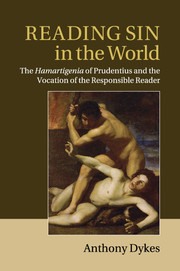Book contents
- Frontmatter
- Contents
- Acknowledgements
- Abbreviations, manuals and works of reference
- Bible texts used
- Classical texts used
- Electronic resources
- The names of biblical characters
- Vocabulary and style
- 1 Introduction: ‘Prudentius counts’
- 2 The world projects human responsibility
- 3 The vocation of the responsible reader: the biblical strategy
- 4 The vocation of the responsible reader: the genre strategy
- 5 Conclusion
- Appendix A A note on the title of the Hamartigenia
- Appendix B A brief note on the date and circulation of the Vulgate Genesis
- Bibliography
- Index
5 - Conclusion
Published online by Cambridge University Press: 03 May 2011
- Frontmatter
- Contents
- Acknowledgements
- Abbreviations, manuals and works of reference
- Bible texts used
- Classical texts used
- Electronic resources
- The names of biblical characters
- Vocabulary and style
- 1 Introduction: ‘Prudentius counts’
- 2 The world projects human responsibility
- 3 The vocation of the responsible reader: the biblical strategy
- 4 The vocation of the responsible reader: the genre strategy
- 5 Conclusion
- Appendix A A note on the title of the Hamartigenia
- Appendix B A brief note on the date and circulation of the Vulgate Genesis
- Bibliography
- Index
Summary
The Hamartigenia is an agent in forming the vocation of the responsible reader: it sets forth the conditions to create such a reader and is a dynamic agent in forming the vocation of the reader it proposes. In performing these moves the Hamartigenia calls the reader to read for unity, yet frustrates the achievement of that unity. The poem offers comfortable niches for settled reading and then evicts the reader from any cosy refuge. Even when the Hamartigenia calls the reader to acknowledge the unity between the different books of the Bible, and between the Old and New Testaments, it then problematizes this unity by manipulating the very texts which the poem has told the reader to check and to trust. How do we react to this reading experience? Are we called to celebrate the impasse, or to take pleasure in the poem's (apparent) contradictions? Should we not rather argue that all is really unified at some level in the Hamartigenia, even if it is at a level we are insufficiently skilled to see? The consideration of genre, which readers regularly think will be somehow clarifying, does not seem to be much help here. The Hamartigenia ‘uocat hinc …inde’ (721), and the reader undergoes Adam's experience of wavering. The certainties the poem proposes, both by appeals to the authority of scriptural sources and by the signs of generic stability, are not certainties which it allows the reader to maintain.
- Type
- Chapter
- Information
- Reading Sin in the WorldThe Hamartigenia of Prudentius and the Vocation of the Responsible Reader, pp. 245 - 248Publisher: Cambridge University PressPrint publication year: 2011



